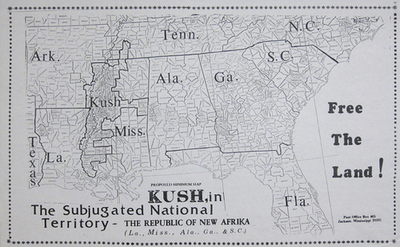
Election Begs Question of the Road to Dual Power in New Afrika

Even though the rate of white voter turnout was more than twice that of New Afrikans, and some 90% of whites supported the other guy, Lumumba came out victorious.(1) All of these facts support the decision of the MXGM to focus on building a base of power within New Afrika in Jackson, Mississippi. However, elections themselves cannot be a tool for liberation or independence, and the only cases where MIM(Prisons) might promote them would be for tactical victories. This election was part of a strategic plan that MXGM released almost a year ago.
This plan states:
“The Malcolm X Grassroots Movement (MXGM) firmly believes that at this stage in the struggle for Black Liberation that the movement must be firmly committed to building and exercising what we have come to regard as ‘dual power’ – building autonomous power outside of the realm of the state (i.e. the government) in the form of People’s Assemblies and engaging electoral politics on a limited scale with the express intent of building radical voting blocks and electing candidates drawn from the ranks of the Assemblies themselves.”(2)
The idea of the oppressed nations building organizations that are independent of and not funded by the state can be a controversial issue in this country. While there is nothing illegal or inherently threatening about organizing independent from the state, Amerikans rely on repression in order to prevent the self-determination of the oppressed nations. If the oppressed nations are to break free from imperialism’s choke hold, it will threaten the luxurious lifestyles of the average Joe the plumber who lives off the wealth of oppressed nations abroad. We saw one example of this mentality among Amerikans when recent issues of Under Lock & Key were censored in North Carolina specifically citing as the justification the fifth point of the United Front for Peace in Prisons – Independence.
While “independence” is a fairly broad term used to define a thing in relation to another thing, “dual power” has a much more specific meaning to Marxists. Independence on its own does not constitute the establishment of “dual power.” When MXGM uses the term “dual power” they appear to really be talking about parallel strategies of community organizing and electoral politics.
The condition of dual power actually exists when there is an emerging state coming up against an existent, and dying state. This, of course, is the product of class struggle, the motive force of history. In discussing Engels’ ideas in defining what state power is, Lenin wrote:
“What does this power mainly consist of? It consists of special bodies of armed men having prisons, etc., at their command. … A standing army and police are the chief instruments of state power.”(3)
Dual, of course meaning two, would imply that you would have two different political structures with their own police, army and prisons, etc. in order to have dual power. Such a situation would mean that a civil war had begun. When Lenin first coined the term in 1917 he was speaking of the emerging Soviets of Workers’ and Soldiers’ Deputies that would seize state power later that same year.(4) Certainly this is not the condition in Mississippi today.
MXGM recognizes their electoral efforts are limited, and considers them one pillar of their strategy of building political power in the region that is separate from their work to build autonomous structures (People’s Assemblies).(2) But these People’s Assemblies are not parallel to the Soviets in 1917 or the liberated zones in China in 1948 or even the countless regions in the world today where power is held by emerging states (see Palestine, India, Colombia, the Philippines, etc).
Within the context of oppressed nation territory, there is an argument to be made for engaging in electoral politics as a step towards building one’s base. While the Lumumba campaign has a clear connection to revolutionary nationalism, it is not based in proletarian ideology. Revolutionary nationalism can come in different class forms. The lack of proletarian ideology leads them to succumb to populism. Populism threatens New Afrikan independence because of the economic pull of U.$. imperialism. With “economic development” as part of his political platform, it seems hard for Lumumba to avoid playing the role of bribing his own people with superprofits won from imperialism. This is one reason it is hard to justify supporting electoral work except to make tactical gains.
The MXGM economic program, the “third pillar” of their Jackson Plan, focuses on cooperative economics and building green economies. Such a strategy does not confront the structure of capitalism, but is a concession to petty bourgeois idealism. As long as capitalism exists people are either exploited or exploiters, so all efforts should be on exposing the need to end that system rather than white-washing it with co-ops and eco-friendly operations. There is no example in history of building new economic systems that effectively challenged capitalism without first establishing true dual power. Therefore if dual power is not feasible in our conditions, these economic strategies become reformist at best. We are better off struggling to maintain our political independence at this stage.
While running for and being elected Mayor limits Chokwe Lumumba politically, the public release of the Jackson-Kush Plan a year prior means that his landslide victory represents a majority of New Afrikans in Jackson who are at least open to the idea that political independence from Amerika is in the interests of their nation. Establishing that fact in the eyes of the New Afrikan masses is one small victory on the road to New Afrikan liberation. But electoral politics are a feeble bridge. The more people rely on it to reach liberation, the sooner it will fall out beneath them. Unless the bridge is strengthened with correct revolutionary theory, it will be doomed to leave the New Afrikan masses on the wrong side of history.








